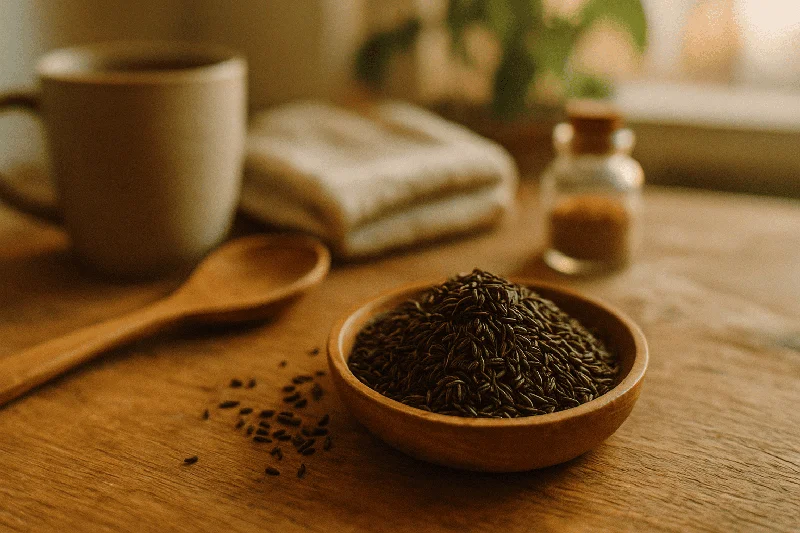Ask Ayurvedic doctor a question and get a consultation online on the problem of your concern in a free or paid mode. More than 2,000 experienced doctors work and wait for your questions on our site and help users to solve their health problems every day.
Krishna Jeeraka: Ancient Spice for Postpartum Care and Wellness

Introduction to Krishna Jeeraka
Krishna Jeeraka, commonly known as Black Caraway (Bunium persicum), is an ancient Indian spice revered in Ayurvedic tradition. With a rich history of use in culinary and medicinal contexts, this dark-hued seed is particularly celebrated for its role in postpartum care for mothers. Beyond childbirth, Krishna Jeeraka offers a multitude of benefits, including support for eye health, relief from bloating, and soothing of nausea and vomiting. This article delves into the Ayurvedic perspective on Krishna Jeeraka, its diverse uses, and guidance on incorporating this spice into daily wellness routines.
Don't wait or self medicate. Start chat with Doctor NOW
Ayurvedic Perspective on Krishna Jeeraka
In Ayurveda, spices are not just flavor enhancers but potent therapeutic agents that influence the body's doshas (Vata, Pitta, Kapha) and support digestion, immunity, and overall balance. Krishna Jeeraka, due to its warming and carminative properties, is believed to balance Vata and Kapha doshas, making it especially valuable in digestive and reproductive health.
Historically, Krishna Jeeraka has been recommended for postpartum care, helping new mothers recover by improving digestion, reducing bloating, and enhancing energy. Its properties are also considered beneficial for vision and alleviating gastrointestinal discomfort, aligning with Ayurveda's holistic approach to healing and wellness.
Key Benefits and Uses of Krishna Jeeraka
1. Postpartum Care
- Digestive Support: After childbirth, mothers often experience digestive disturbances. Krishna Jeeraka is used to stimulate Agni (digestive fire), improve digestion, and reduce gas and bloating.
- Rejuvenation: Its nourishing qualities help restore strength and vitality during the postpartum period, supporting the mother's recovery.
2. Eye Health
- Vision Support: Traditional Ayurvedic texts suggest that Krishna Jeeraka may contribute to better eye health. While modern research on this specific benefit is limited, its antioxidant properties could potentially support ocular functions and reduce eye strain.
3. Relief from Bloating and Vomiting
- Carminative Action: The spice is known for its carminative properties, which help expel gas from the gastrointestinal tract, thereby reducing bloating.
- Anti-emetic Effects: Krishna Jeeraka can soothe the stomach lining and reduce nausea, making it useful in cases of vomiting and indigestion.
4. General Wellness
- Immune Support: Rich in antioxidants, Krishna Jeeraka may bolster the immune system, providing protective benefits against infections.
- Anti-inflammatory Properties: Its inherent anti-inflammatory compounds help mitigate minor inflammations, contributing to overall health.
Mechanism of Action: How Krishna Jeeraka Works
Krishna Jeeraka contains volatile oils and bioactive compounds that impart its therapeutic properties:
- Digestive Stimulation: Compounds in Black Caraway stimulate digestive enzymes, enhancing the breakdown and assimilation of food.
- Carminative Effects: It relaxes gastrointestinal muscles, aiding the expulsion of gas and relieving bloating.
- Anti-inflammatory and Antioxidant Actions: These properties help reduce oxidative stress and inflammation, supporting cellular health, including that of the eyes.
- Balancing Doshas: By warming and stabilizing Vata and Kapha doshas, Krishna Jeeraka ensures smooth function of bodily systems, especially the digestive and reproductive systems.
Recommended Usage and Best Practices
Incorporating Krishna Jeeraka in Diet
- Spice Blend: Add a pinch of Krishna Jeeraka to soups, stews, and herbal teas to aid digestion and enhance flavor.
- Postpartum Remedies: New mothers can consume Krishna Jeeraka tea or incorporate it into congee-like dishes to support recovery and ease digestive issues.
- Eye Health: Some traditional practices involve using cooled, infused oils containing Krishna Jeeraka for gentle eye massages or as part of eye-washes (with caution and proper guidance).
Dosage and Precautions
- General Dosage: For general wellness and digestive support, ½ to 1 teaspoon of Krishna Jeeraka powder per day, when added to food or tea, is typically sufficient. Always consult with an Ayurvedic practitioner for personalized advice.
- Safety Precautions: While Krishna Jeeraka is generally safe, those with specific allergies or digestive conditions should consult a healthcare provider. It is advisable to start with a small amount to assess tolerance.
- Pregnancy and Nursing: Pregnant or nursing mothers should seek professional guidance before using Krishna Jeeraka to ensure its safety and appropriate dosage.
Conclusion
Krishna Jeeraka stands as a testament to the wisdom of ancient Ayurvedic practices, offering a natural remedy for postpartum care, digestive issues, eye health, and overall well-being. By integrating this spice into diets and wellness routines under professional guidance, individuals can harness its therapeutic potential. Whether alleviating bloating, supporting new mothers, or contributing to ocular health, Krishna Jeeraka remains a valuable asset in holistic Ayurvedic care.
Note: While Krishna Jeeraka has a long history of use in Ayurveda, it is essential to consult healthcare professionals or Ayurvedic practitioners before starting any new regimen, especially for specific health conditions or during pregnancy.
References & Further Reading
-
Government of India, Ministry of AYUSH. The Ayurvedic Formulary of India. New Delhi: Government of India; 2011.
Provides information on Ayurvedic herbs and spices, their properties, and uses. -
Sharma PV. Scientific Basis for Ayurvedic Therapies. New Delhi: CRC Press; 1994.
Explores the principles behind Ayurvedic remedies and the action of various herbs. -
Lad V. Ayurveda: The Science of Self-Healing. Twin Lakes, WI: Lotus Press; 1984.
An introductory text on Ayurveda that discusses the therapeutic use of spices like Krishna Jeeraka. -
Mukherjee PK, Rai S. Herbal Medicines: Development and Uses in a Global Era. Boca Raton: CRC Press; 2013.
Offers insights into the development, pharmacology, and global applications of herbal medicines, including caraway and related spices. -
Traditional Ayurvedic Texts and Journals
For more detailed studies on Krishna Jeeraka, consult classical Ayurvedic texts and contemporary research articles focusing on its medicinal properties and applications.

